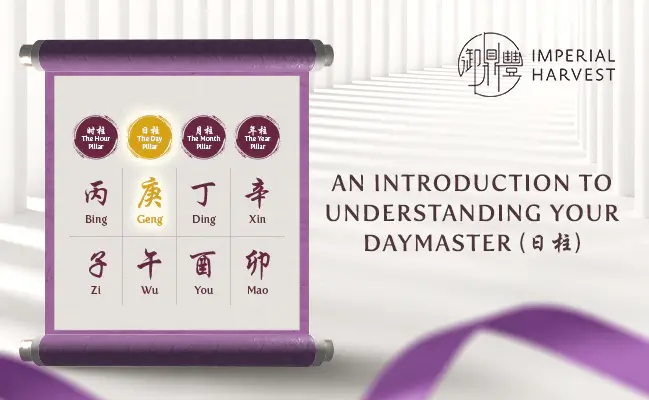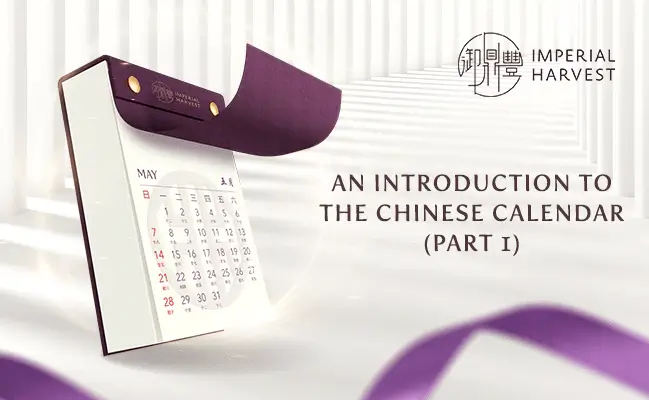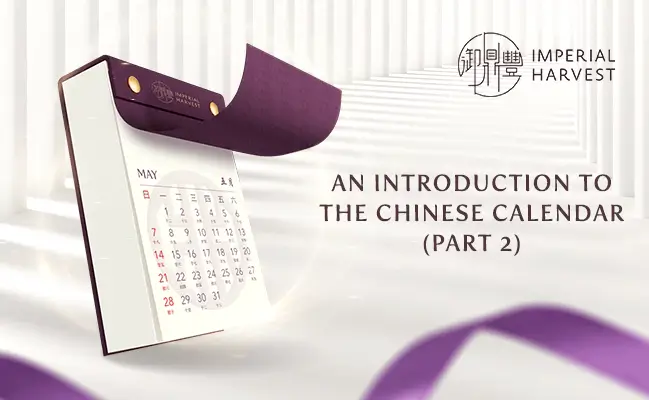

Posted by Imperial Harvest on 08 September 2023
Introduction to the 12 Earthly Branches (十二地支)
Estimated Reading Time: 5 mins
The 12 Earthly Branches, or “ 地支” (di zhi), form a fundamental ordering system that has been used throughout East Asia in various contexts for centuries. This system has deep-rooted significance in Chinese metaphysics, astrology, calendrical traditions, and more. The 12 Earthly Branches have a rich and multifaceted role in shaping the cultural and spiritual landscape of East Asia.
The 12 Earthly Branches are Yin (寅), Mao ( 卯), Chen (辰), Si (巳), Wu (午), Wei (未), Shen (申), You (酉), Xu (戌), Hai (亥), Zi (子) and Chou (丑).
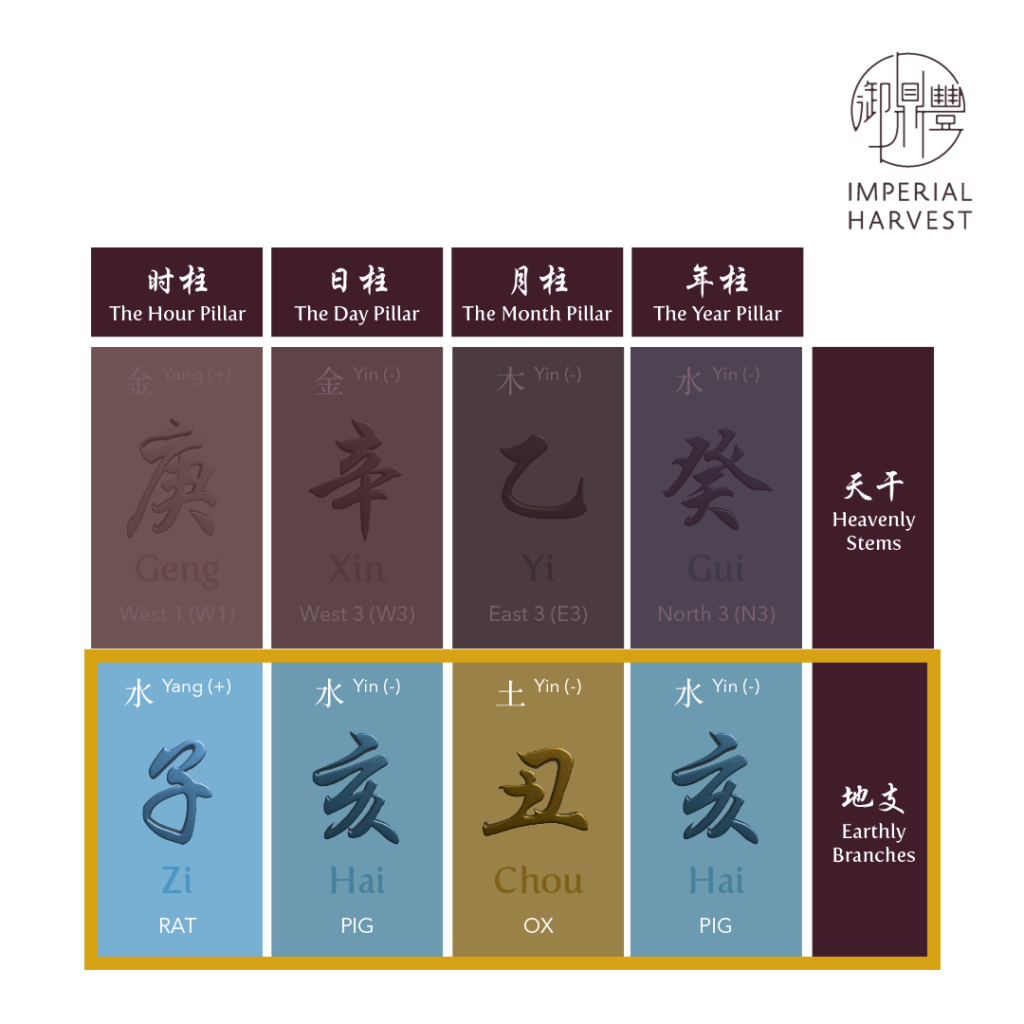
Origins of the 12 Earthly Branches
Their origins can be traced back to the Shang dynasty (c. 1600 to 1046 BCE), where it was built from the observations of the planet, Jupiter’s, orbit. While they were initially used to mark time and seasons, this system evolved and became more complex, intertwining with various aspects of Chinese metaphysics.
The Earthly Branches are an integral part of the modern “traditional Chinese calendar” and are also used in Taoism, often in conjunction with the Heavenly Stems. The Stem-Branch combination is a relatively recent method for marking time. During the Shang dynasty (1600 to 1046 BC), the 10 Heavenly Stems were originally used to name the days of the week and were thought to be associated with the ritual calendars of Chinese emperors.
Today, the 12 Earthly Branches continue to play a vital role in the Chinese calendar, which melds the lunar month cycle and the solar year cycle. The traditional Chinese calendar is structured around the Earthly Branches and their interactions with the Heavenly Stems (天干), forming the sexagenary calendar system (六十干支). This system is used not only for marking dates but also for selecting auspicious times for various activities, such as weddings or conducting business endeavours.
Different Associations of the 12 Earthly Branches
One of the most well-known aspects of the 12 Earthly Branches is their association with the Chinese Zodiac. Chinese astronomers partitioned the celestial circle into a 12-year system, tracking Jupiter, also known as the Year Star (歲星), in its orbit of the sun. In Chinese metaphysics, Jupiter’s 12-year cycle was thought to correspond to several aspects of the Chinese cosmological system, including the 12 months of the year, 12 zodiac animals, cardinal directions, seasons, and the division of each day into 12 traditional Chinese two-hour time units.
Some associations are as follows:
| Earthly Branch (month) | Associated Zodiac | Element | Polarity | Dates | Hour | Body parts |
|---|---|---|---|---|---|---|
| 寅 (yín) | Tiger | Jia Wood | Yang | 4 Feb to 5 Mar | 3am to 4.59am | Gallbladder Hands Legs |
| 卯 (mǎo) | Rabbit | Yi Wood | Yin | Mar 6 to Apr 4 | 5am to 6.59am | Fingers Hair Liver |
| 辰 (chén) | Dragon | Wu Earth | Yang | 5 Apr to 5 May | 7 am to 8.59am | Chest Back Skin |
| 巳 (sì) | Snake | Ding Fire | Yin | 6 May to Jun 5 | 9 am to 10.59am | Face Throat Teeth |
| 午 (wǔ) | Horse | Bing Fire | Yang | Jun 6 to Jul 6 | 11am to 12.59pm | Mental Health Eyes Head Brain |
| 未 (wèi) | Goat | Ji Earth | Yin | Jul 7 to Aug 7 | 1pm to 2.59pm | Abdomen Diaphragm Spine |
| 申(shēn) | Monkey | Geng Metal | Yang | Aug 8 to 7 Sept | 3pm to 4.59pm | Veins and nerves Large intestine Lungs |
| 酉 (yǒu) | Rooster | Xin Metal | Yin | 8 Sept to 7 Oct | 5pm to 6.59pm | Nose Small intestine |
| 戌 (xū) | Dog | Wu Earth | Yang | 8 Oct to 6 Nov | 7pm to 8.59pm | Feet Ankle Legs Knees |
| 亥 (hài) | Pig | Gui Water | Yin | 7 Nov to 6 Dec | 9pm to 10.59pm | Lower body Bladder |
| 子 (zǐ) | Rat | Ren Water | Yang | 7 Dec to 5 Jan | 11pm to 12.59am | Ears Bladder |
| 丑 (chǒu) | Ox | Ji Earth | Yin | 6 Jan to 3 Feb | 1am to 2.59am | Spleen Feet Legs Stomach Chest |
Six Harmony Combinations (六合)
In the art of Bazi, the Six Harmony Combinations refer to specific combinations of the Earthly Branches within a person’s Bazi chart. These combinations are believed to have a significant influence on an individual’s personality, destiny, and life experiences. The Six Harmony Combinations are considered one of the key factors in Bazi analysis and can signify a harmonious relationship between the animals involved.
Six Harmony Combinations are believed to bring various effects, including enhanced compatibility, smoother interpersonal relationships, and increased opportunities for success. The Six Harmony Combinations are always made up of a Yin and Yang branch.
Similarly to other elements of Bazi analysis, the interpretation of Six Harmony Combinations is highly individualised. Their positions in the Bazi chart and the overall context of the chart are all considered when assessing the impact of these combinations. Experienced Bazi practitioners use their knowledge of the interactions between the Five Elements, and their expertise to provide detailed insights into how Six Harmony Combinations influence a person’s life path.
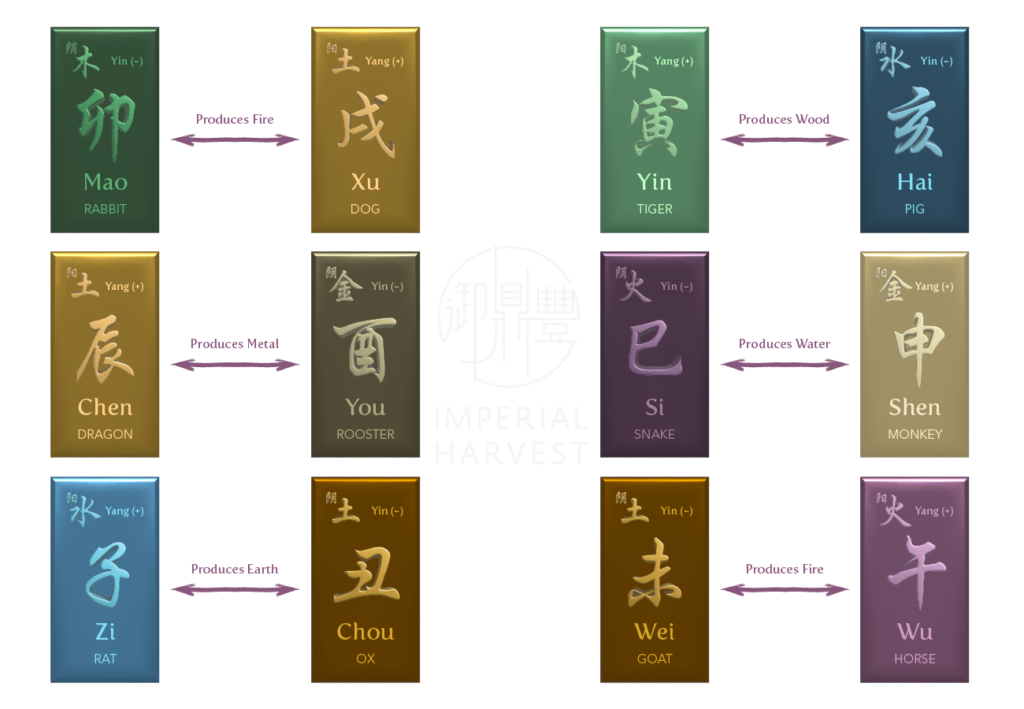
The Six Harmony Combinations, also known as “Liu He” (六合), are associated with unique imagery and attributes:
Mao and Xu (卯戌相合): This combination is associated with the depiction of a barren mountain, which transforms into a beautiful landmark with the addition of greenery. Individuals with this combination are respectful and diplomatic, placing value on maintaining harmonious relationships. This combination produces Fire, due to the interaction between Wu Earth (戊土) and Yi Wood (乙木).
Chen and You (辰酉合): Associated with the imagery of a tall mountain, in which the addition of a treasure atop its peak would allow it a more imposing appearance, thereby enhancing its authority. This combination is attributed to power and authority, although it may be indicative of potential conflicts and lawsuits. Due to the interactions between Wu Earth and Xin Metal (辛金), this combination produces Earth.
Zi and Chou (子丑合): Through the interplay between Ji Earth and Gui Water, this combination produces Earth. Where the Earth provides a stable and supportive foundation, the cloud, represented by Gui Water, brings intuition and intelligence to complement each other’s weaknesses. This combination is attributed to stability, security, trustworthiness and confidence.
Yin and Hai (寅亥合): Just as water nourishes nature, the interactions between Ren Water and Jia Wood produce Wood — accumulating wisdom and amplifying progression. The Tiger-Pig Harmony combination is attributed to growth, improvement, productivity and discovery.
Si and Shen (巳申合): Likened to the melting of metal into a liquid state when exposed to great heat, allowing it to take on any shape, this combination produces Water in the Six Harmony Combinations. The Snake-Monkey combination is often related to attributes of wisdom, intelligence, honour and productivity garnered from interacting with other individuals.
Wu and Wei (午未合): This combination is symbolically represented by the image of fire erupting from the earth, thereby producing Fire. Embodying transformation, this fire extracts precious minerals from deep within the earth, suggesting the unlocking of hidden potential, talents, and resources that were previously untapped. This combination is related to literary pursuits, good entrepreneurial skills and foresight, and good communication skills.
Six Clashes in the Earthly Branches (六冲)
The Six Clashes within the 12 Earthly Branches signify opposition, reflecting conflicts in elemental harmony. Clashes may have both positive and negative effects, as these branches symbolise the core and foundation of various aspects of a person or scenario. As such, positive relationships within an individual’s Bazi chart affect the Earthly Branches and exert a profound and enduring influence, whereas negative relationships can have lasting adverse effects.
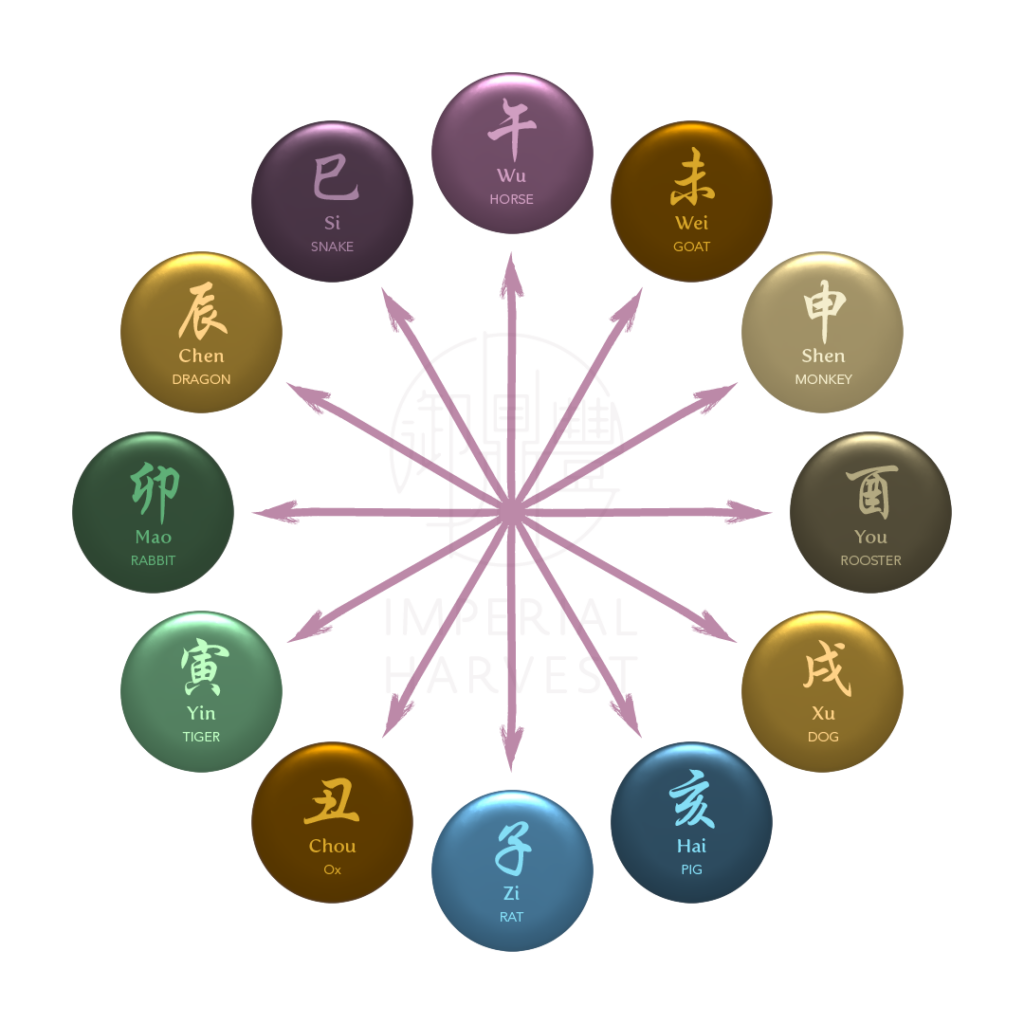
The Six Clashes have their implications and attributes, and are as follows:
Chen and Xu (辰戌相冲): Both aligned with the Wu Earth element, this clash is akin to conflicts rooted in the realm of responsibilities. Often, it can be associated with individuals who vie for dominance or indecision, resulting in power struggles. This clash may also manifest as traits such as excessive ambition or quick temper, potentially leading to unwise investments or a reduced lifespan.
Si and Hai (巳亥相冲): This clash is linked to misunderstandings and hidden conflicts. It may indicate situations where individuals are not transparent in their intentions or may harbour hidden resentments — such as unintentionally offending others or offering help when not needed.
Yin and Shen (寅申相冲): The clash between Yin and Shen often represents clashes between personality and interests, leading to emotional turmoil. This clash indicates different approaches to life, which can result in conflicts and misunderstandings.
Mao and You (卯酉相冲): The Rabbit and Rooster clash involves disputes over details and methods. Those who experience this clash may have differing views on how to accomplish tasks or achieve goals, leading to friction, betrayal or sharp judgment.
Zi and Wu (子午相冲): This clash can be summarised as a conflict between logic and emotions, with the circumstances denoting an individual’s thoughts being at odds with their emotions regarding a specific situation. This may manifest in unease and turbulence in an individual’s decisions.
Chou and Wei (丑未相冲): Signifying inflexibility and stagnation, this clash indicates conflicts due to a differing approach to life, which can result in conflicts and misunderstandings. This clash is attributed to obstacles and hindrances towards progress and an argumentative and stubborn outlook.
Six Harms in the Earthly Branches (六害)
The Six Harms are formed when one of the Earthly Branches is hindered from combining with another. For example, when Wei combines with Wu to form one of the Six Harmony Combinations, Zi clashes with Wu, in turn, “harming” it, stopping the union of Wei and Wu.
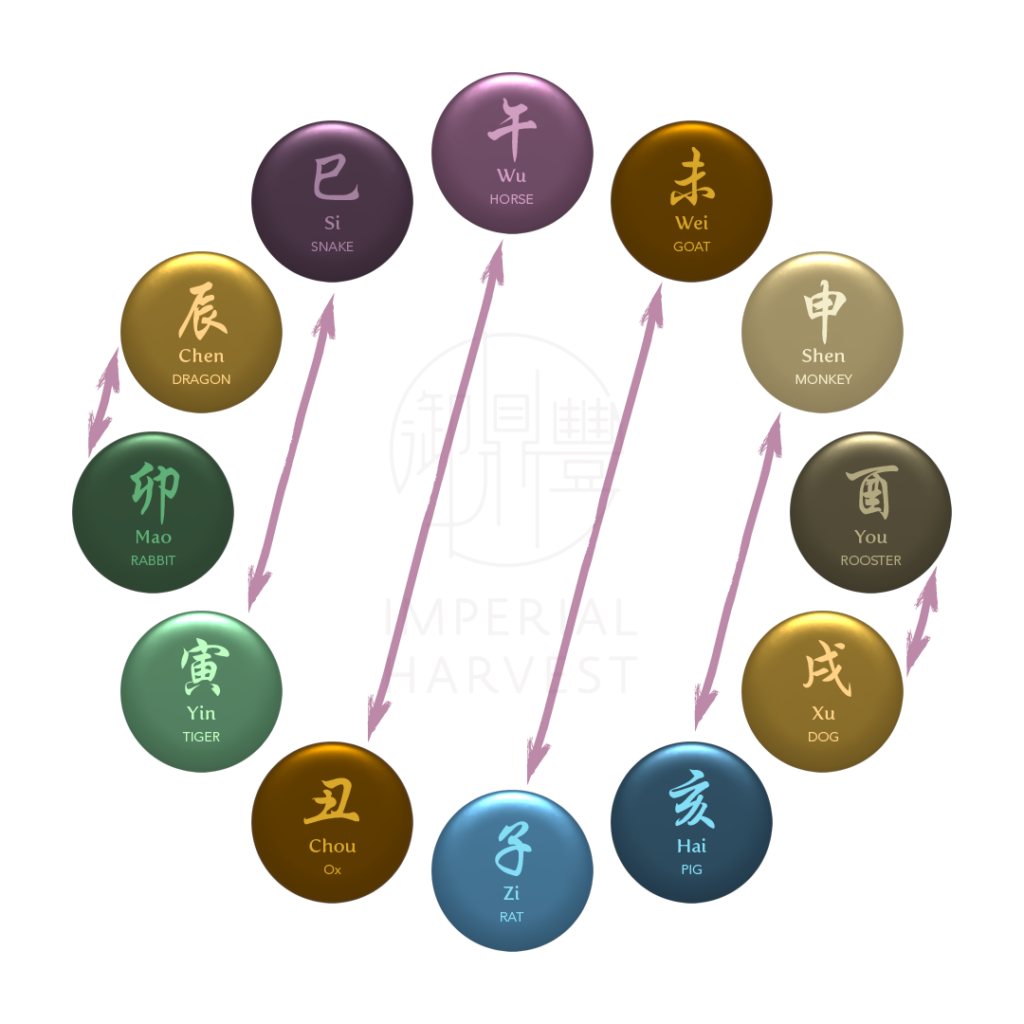
The Six Harms and their associated effects are as follows:
Mao and Chen (卯辰相害): The effects of this combination may manifest in individuals doubting their abilities, plagued by an incessant fear of not measuring up to their own expectations. This self-doubt is further exacerbated by their inherent difficulty in interacting with people, a trait that may stem from a tendency to assume the worst about themselves. Additionally, they might grapple with the constant fear of being taken advantage of, perpetually wary of betrayal from even their closest companions.
You and Xu (酉戌相害): Individuals within this pairing frequently grapple with issues related to low self-esteem, consistently underestimating their capabilities while harbouring a constant worry about an uncertain future. This combination needs to be vigilant against potential injuries, particularly those concerning the back, face, or head. Moreover, the high risk of divorce casts a shadow over their relationships, necessitating careful navigation and communication to foster stability and harmony in their partnerships.
Shen and Hai (申亥相害): This combination may manifest in individuals grappling with a deep-seated fear of commitment, which leads them to be cautious about accepting help from others, fearing that their actions may inadvertently cause harm to those they assist. Their vigilance often leads them to focus on the wrong priorities and assume the worst possible outcomes. To maintain harmony, they must watch their words and exercise caution when communicating to avoid unnecessary conflicts and ensure their relationships remain steadfast.
Chou and Wu (丑午相害): The Ox-Horse Six Harm combination brings issues around self-worth, with individuals questioning their abilities and self-worth while feeling undervalued and unrecognised by others. This inner turmoil can lead them to withhold giving their full effort, as they tend to assume the worst about their potential. Additionally, they may struggle with an unwillingness to truly understand their partners, potentially straining their relationships.
Zi and Wei (子未相害): The Six Harm combination between Rat and Goat often contends with clouded judgment, tending to exaggerate problems and a loss of independence. This can lead to an aversion to taking risks, with a tendency to assume the worst-case scenario in various situations.
Yin and Si (寅巳相害): This combination often indicates an innate distrust of helpful individuals and scepticism surrounding the intentions of others. Individuals may harbour an unwarranted fear of positive experiences and assume the worst in their interactions with others. It is crucial to note that when this combination is dominant in a Bazi chart, it may signify a heightened risk of serious accidents, emphasising the importance of mitigating these negative effects.
In the art of Bazi, the 12 Earthly Branches play an important role in shaping our lives. Detailed insight into the implications and interactions between the 12 Earthly Branches helps us to understand our strengths, weaknesses, and relationships with others, guiding our journey of self-discovery and growth through Bazi’s wisdom.
Imperial Harvest’s expert consultants are always on hand to guide you on your journey and provide you with insights to help you realise your fullest potential. Book a complimentary consultation today or contact us at +65 92301640.
We are located at
For prospective clients: Imperial Harvest402 Orchard Road
Delfi Orchard #02-07/08
Singapore 238876 For existing clients: Imperial Harvest Prestige
402 Orchard Road
Delfi Orchard #03-24/25
Singapore 238876
Most Read Articles
Get to read our life changing articles and get inspired.
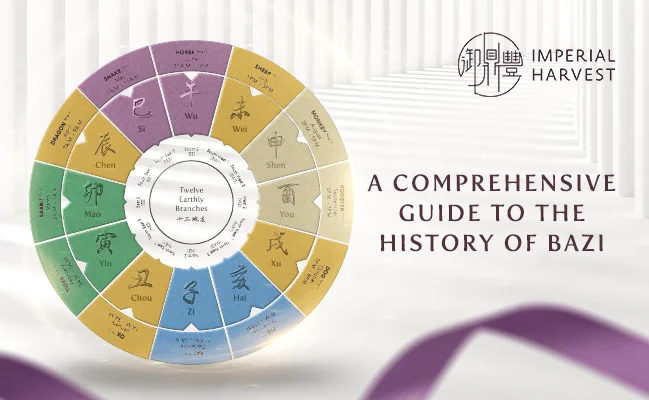
A Comprehensive Guide to the History of Bazi (八字)
Estimated Reading Time: 5 mins Bazi (八字) is often mistakenly assumed as the Chinese counterpart of western Astrology. The similarities between both systems lie in their utilisation of birth dates and time in their calculations, and the ability to be read from a tabulated chart. Where Astrology may take into account the positions of different […]

Imperial Harvest Consecration Ceremony
Estimated Reading Time: 5 mins At Imperial Harvest, each earthly treasure undergoes a series of consecration rites performed by Master David, before it is bestowed upon its blessed owner. Every aspect of these sacred Chinese anointing rituals is carefully examined and accurately represented in Master David’s blessings, reflecting Imperial Harvest’s deep respect for these esteemed […]
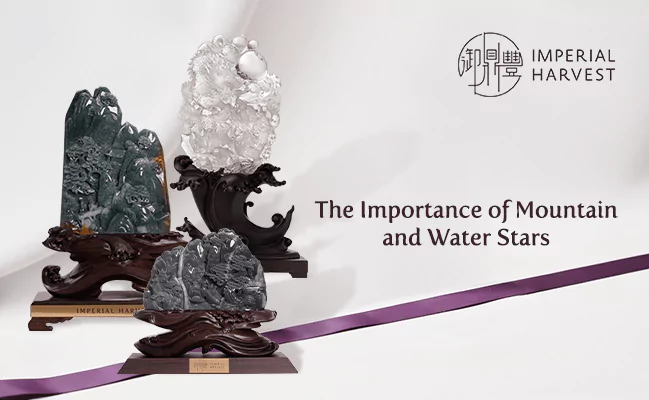
The Importance of Mountain and Water Stars
Estimated Reading Time: 4 mins “山管人丁,水管财”, is a well-cited principle in the study of Imperial Feng Shui that translates to “Mountains govern benefactors, authority and harmony, while Water governs wealth, opportunities and intuition”. This principle reiterates a critical factor in Imperial Feng Shui — balance is the key to achieving success in life. As mountain […]
